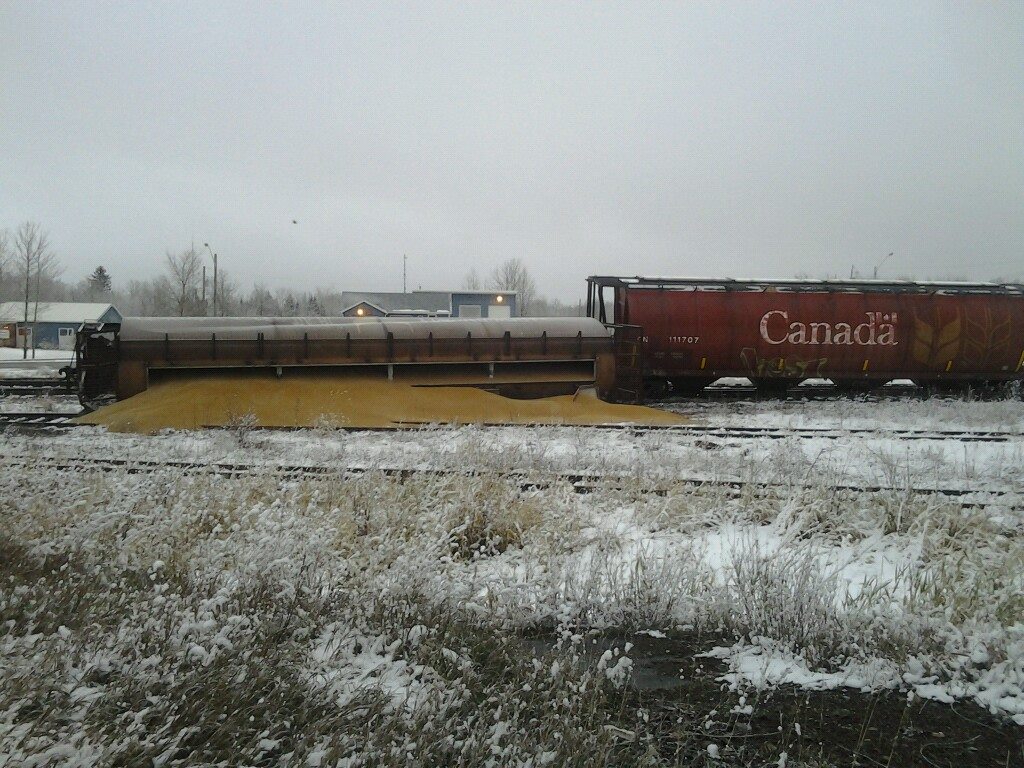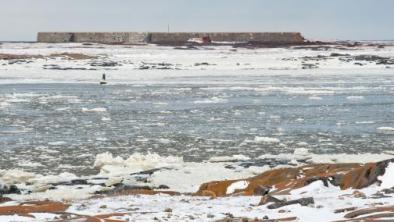Omnitrax faces long winter as Arctic oil shipment delayed
iPolitics

Omnitrax – the U.S. rail company with an ambitious plan to ship oil through Hudson’s Bay and over Manitoba’s permafrost-covered north – has bumped their plans for a test-run until next summer.
An inspection that uncovered weak piping at the Port of Churchill’s tank farm and public opposition from communities and First Nations who live near the railway that supplies the port forced Omnitrax to drop its plans to export 330,000 barrels of light crude oil — or one Panamax marine tanker — this shipping season.
“We weren’t ready,” said Merv Tweed, president of subsidiary Omnitrax Canada and, until this September, the Conservative member of Parliament for Brandon-Souris, a riding in southern Manitoba. “We needed to do more outreach to communities and that is ongoing now. ”
As ice and bad weather seal the end of this year’s shipping window, Omnitrax is hunkering down for the winter with a lengthy list of reviews and upgrades it needs to undertake to re-launch the test in sunnier climes.
An independent consulting firm is currently examining every aspect of the Omnitrax plan, which includes sending oil along the railway that it owns and shipping it from the Port of Churchill, which the Denver-based firm also owns.
The consultant’s report will examine the safety of the railway, the port and the port’s fuel storage tank farm, said Tweed. It will also examine Omnitrax’s plan to have the unrefined oil shipped through Arctic waters towards Europe, as well as the economics of the entire scheme
The report, which Tweed hopes will be ready by January, will determine what Omnitrax has to do so that it can meet the many regulatory requirements involved. With the aim of launching a test-run in July, the firm is moving ahead with upgrades and training so that the reality on the ground can meet the consultant’s recommendation as quickly as possible.
It all makes for one wallop of a project – one that also has to prepare for coming reforms to federal rail safety regulations brought on by the Lac-Megantic disaster and changes to federal marine spill rules sparked by fears of a oil spill off B.C.’s Pacific Coast.
Tank farm inspection reveals weakness in pipes
In September, Omnitrax asked independent consultants to test the lines that run throughout a fuel tank farm situated at the Port of Churchill .
The farm exists not only to supply ships that visit the port, but also because Churchill is used to ship fuel to communities in Nunavut. The tank farm can carry up to 50 million litres in petroleum products and has been used to store gasoline, diesel, heating oil and aviation fuel.
The consultants found that the inner lining of some of the pipes broke when pressure was applied, despite the second, outer lining remaining intact, said Tweed. The company decided that it will have to build a new loading system at the port for the summer test-run, he said.
“All they did was pressure test the lines and they weren’t up to snuff,” he said.
The broken pipes do not affect all of the storage tanks, hence the ones that are currently carrying oil for the Nunavut communities today.
“When we do the first shipment, we will do it directly off the tanks – off the cars, themselves – and onto the boat,” he said.
Omnitrax will look at improving the tank farm after the test, he said said, though the tank farm issue is one of the reasons for the delay.
Consultations struck wrong chord: environmentalist
Shortly after plans for a test-run this year became public this summer, Omnitrax began a series of open houses in towns along the rail road route.
Some of the opposition heard during consultation was enough to force the company to rethink the timing of its maiden voyage.
“It’s something that we understand the communities are concerned about and we do not want to proceed until we’re very, very clear about what we’re doing and that we’re capable of doing it in a safe fashion,” said Tweed.
However, Eric Reder, a Manitoba-based campaign director for the Wilderness Committee, said he has spoken to half a dozen people who attended an open house in Churchill this past August, and they all told him that they felt the consultation was cosmetic as Omnitrax officials told them the firm already has all the regulations it needs.
“If you walk around the community, I met two people who support this (project),” said Reder.
The Keewatin Tribal Council, which represents ten First Nations reserves in northern Manitoba, also came out against the test-run in September.
“Our communities do not take any comfort with an 80-year-old northern rail line carrying an additional 330,000 barrels of crude oil travelling through our communities, risking our territory that is still used for trapping, hunting and spiritual purposes,” said the council’s tribal chief, Irvin Sinclair, in a statement issued on September 16.
Railway risks a chief target
The Omnitrax-owned Hudson’s Bay Railway has received the bulk of criticism from the plan’s opponents.
The vast majority of the 1,000 kilometre long railway runs between The Pas, Manitoba and Churchill, the route the unrefined product will take to get to the port.
Every shipment destined to fill one Panamax ship would mean six trains of 80 oil-carrying cars each. If the test-run works and Omnitrax goes full-tilt with its plans, it hopes to fill eight to ten Panamax ships a summer.
The tracks run over permafrost, which contorts the surface and warps the railway during temperature changes.
There have been 63 accidents between 2003 and 2012 on the railway and 50 of those were derailments, said Reder.
In the three days after he visited Churchill in early November, a grain car went off the tracks and another derailment occurred at the port, he said.
“Even now, with all the attention on them, they can’t keep the rails on the track,” he said.
The railway’s safety record has gotten dramatically better in the last two years, said Tweed, as repairs have had an impact.
Omnitrax is looking at slowing down the trains, letting them run at night or having them run during colder temperatures as a means of mitigating risk, said Tweed.
The federal and provincial governments pitched in $40 million to repair the railway in 2007, while the company has made over $100 million in investments, said Tweed.
But the Manitoba government came out against Omnitrax’s plan to ship crude by rail to Churchill, according to story by the Canadian Press in September.
A 2010 report by the Canadian and Manitoba governments on the future prospects of the Port of Churchill identified crude as a potential export, but said the railway is not “well-suited” to heavier crude-carrying rail cars.
Tweed says that’s false.
“It’s not accurate,” said Tweed. “An oil carrying car would be the same weight as a grain carrying car.”
The railway’s regulator is Transport Canada. According to Tweed, the company doesn’t need to get any permits for the new shipments because it already ships refined petroleum products to Churchill.
Neither the fact that Omnitrax plans to ship a different kind of fuel nor the prospect of it shipping a much larger amount of petroleum than it does today requires the firm to get a new permit from its regulator, said Tweed.
But after the Lac-Mégantic crude-by-rail disaster that killed 47 people in May, federal Transport Minister Lisa Raitt announced new railway safety rules were on their way some time this year.
“We were meeting all of the qualifications at the time (of the disaster) but I’m sure there’s going to be more now,” said Tweed.
Provincial transport ministers, who were surprised to find they had no jurisdiction to protect themselves against disasters like the one in Lac-Mégantic, are also exploring ways for them to be better notified of the products shipped through their jurisdictions.
Omnitrax taking Hudson’s Bay into uncharted waters
The test-run will introduce something Hudson’s Bay has never seen before – massive oil tankers.
The Panamax ships that will carry the oil will only be able to operate in the summer months when ice isn’t blocking the route.
Transport Canada regulates the safety of oil loading facilities and oil tankers.
If Omnitrax follows through with its plans, the Port of Churchill will be considered an oil handling facility, said Transport Canada spokesperson Susan McLennan.
That would require the port to set up an agreement with a response organization (RO), the private-sector spill clean-up groups that make up a critical part of Canada’s marine safety policy.
In Churchill’s case, the RO would be the Eastern Canada Response Organization (ECRO). That RO typically covers shipping on the Great Lakes and the Atlantic Coast. A separate RO works on the B.C. coastline.
Whenever Omnitrax signs a contract with an oil tanker company to take the oil out of Churchill, that shipping firm will also have to set up an agreement with the ECRO.
Right now, Omnitrax doesn’t have a firm contract with an oil company or a marine tanker firm to receive the crude that gets to Churchill. It’s in negotiations with over 20 oil companies and between five and six shipping companies to figure out a consortium that will be able to make the grand plan work, said Tweed.
“We have to be able to guarantee the suppliers and the ships coming in that we can do this,” he said.
The arrangements that will have to be struck between the port, the marine tankers and the ECRO will be spelled out in the Canada Shipping Act, 2011. It requires ECRO to have equipment caches and trained personnel in place so that they can respond to a spill within a certain time frame.
But as it stands now, that act and the arrangements it proposes, is designed to regulate the heavy traffic in the Great Lakes and Canada’s East Coast waters.
The closest depots to Hudson’s Bay are in Montreal, Sarnia and Sept-Iles, according to Paul Pouliotte, the ECRO’s chief financial officer.
“Churchill, Manitoba right now is not identified as a primary area of response within our geographic area of response,” said Pouliotte.
Tweed, for his part, says the company isn’t worried about a tangled regulatory process for the marine segment of the project.
“That will be up to a government decision,” he said.
Not unlike the situation on rail regulations, the federal government is undertaking a review of marine shipping rules after public outcry in British Columbia over the plan to introduce more tankers there. An expert panel on marine tanker safety appointed in the spring is expected to publish their final report this month.
The shipping plan could also be impacted by the Arctic Waters Pollution Act, said Transport Canada.
The same 2010 Manitoba-federal government report that mentioned the issue of heavy rail cares also fingers the intriduction of heavier ships in Churchill as a problem because of the strong tides that occur in the area.
“Port depth (draft) at low tide may be a barrier given that oil shipment infrastructure is built to handle larger ships than the Port of Churchill can regularly handle,” says the report.
But Tweed dismissed this complaint. The ships carrying grain that currently leave the port are Panamax boats that hold the same weight as the coming oil tankers, he said.
“What weighs more a pound of feathers or a pound of stone? – It’s still a pound,” he said.
The same consultant’s report that will examine the railway rules will also tell Omnitrax its regulatory prerequisites when it comes to shipping, said Tweed.
“We’re going to take the direction of the experts who tell us where we need to go,” he said.
Windows of opportunity
Omnitrax doesn’t have forever to get its plan rolling.
Several huge pipeline projects are also competing to take oil from Alberta and the American Midwest to tideshore, among them the Northern Gateway pipeline, the Kinder Morgan Trans Mountain expansion, Keystone XL, the Line 9 expansion and Energy East.
On top of this, the North American railroad grid has seen a surge in crude-by-rail transportation over the last few years.
Then there’s the market appetite. Omnitrax says the oil’s destination will be Europe. The European Union is currently debating the introduction of a fuel quality directive (FQD) that would put a premium on fuels that emit the most carbon, a characterization which would cover oil sourced from the Alberta oilsands.
But Tweed says the European FQD decision is not a worry.
“That’s a discussion that’s higher than I can be involved in,” said Tweed.
The window of opportunity for oil leaving Churchill is between five to ten years, according to the 2010 Manitoba and federal government report.
In the meantime, the project’s opponents bemoan the lack of public disclosure. Unlike a pipeline or industrial facility – and because the plan may require no new permits – Omnitrax isn’t required to publish documents outlining its plans in detail.
“This Omnitrax plan, there’s not a single public document,” said Reder.
Photo: A recent derailment involving grain cars near the Port of Churchill (Eric Reder).

